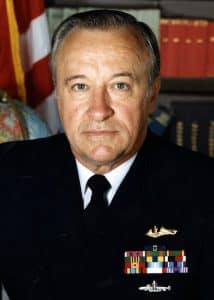Fair winds, Admiral Trost

Monroe County residents may not know much about Admiral Carlisle A.H. Trost, but they have almost certainly driven on one of the numerous streets named after him.
A Valmeyer native, Trost rose through the ranks of the Navy to serve as Chief of Naval Operations from 1986-1990.
He died last Tuesday at age 90 from complications related to a fall.
“He was a warrior, a man of honor and a committed patriot who guided the Navy through difficult times, including conflict in the Middle East and Panama,” current CNO Adm. Mike Gilday said of Trost. “Adm. Trost also led the Navy’s transition from a focus on the Cold War to regional and littoral conflicts around the world. His goal above all else was to be a good husband, a good father, a good friend and a good naval officer.
“No doubt, Adm. Trost was all those things. We have truly lost a great leader and shipmate. Fair winds and following seas, sir. We are stronger for your leadership and grateful for your steadfast commitment to our Navy and nation.”
Born the son of the late Elmer and Luella Trost, Carl, as he was known by friends, did not dream of a life at sea.
He spent summers helping on his grandparents’ farm and he enjoyed farming, but his passion was school.
Trost worked several jobs to pay his tuition at Dupo High School before attending Washington University on a one-year Army ROTC scholarship.
At the end of that year, Trost applied for the U.S. Naval Academy in Annapolis, Md. He began there in 1949, graduating first in his class in 1953. He remains the only CNO to graduate first in his class.
“He came from a humble background of very hardworking and honest people,” said Laura Lee Carrico, Trost’s daughter. “He never really had any intention or knowledge of the Naval Academy, so the fact that he wound up so far away from his roots was kind of a fluke. He thought he would grow up to be a farmer.”
While serving as brigade commander in the academy, Trost met his wife, Pauline Louise Haley, and married her in 1954.
After graduation, he joined the crew of a destroyer before attending submarine school. He was trained in nuclear power, graduating first in that class as well.
As a junior officer, Trost received an Olmstead Scholarship to study at the University of Freiburg in Germany.
During his 37-plus years of service, Trost served in destroyers and diesel and nuclear-powered submarines. He was the executive officer of two submarines and commanding officer of one.
In the 1970s, Trost’s assignments included serving as naval aide to the secretary of the Navy, assistant chief of Naval personnel and director of Navy program planning.
He earned a promotion to flag rank in 1973, after which he commanded Submarine Flotilla One and Submarine Group Five.
He later worked as deputy commander of the U.S. Pacific Fleet, commander of the Seventh Fleet, commander in chief of the U.S. Atlantic Fleet, deputy commander in chief of the U.S. Atlantic Command, military assistant to the deputy secretary of defense, executive assistant to the secretary of the Navy, director of systems analysis division, assistant chief of Naval personnel and director of Navy program planning.
No matter his position, Carrico said her father treated everyone well.
“His integrity was something that stuck with us forever,” she said. “He was very respectful of everyone, no matter what their position in life happened to be. He taught us by example that you never treated anyone in a belittling fashion.”
Trost’s Navy career culminated when President Ronald Reagan appointed him as the 23rd Chief of Naval Operations.
According to the Naval History and Heritage Command, the CNO is in charge of the operations of the Navy’s fleet, with all orders from that position considered as coming from the secretary of the Navy.
In his four years in the position, Trost aimed to maintain the Navy’s global superiority from large threats like the Soviet Union and China and smaller ones like other nations, drug traffickers and terrorists.
He also dealt with military spending cuts of $180 billion.
As CNO, Trost made joint international exercises with allies as part of the Navy’s mission – even visiting the Soviet Union in 1989 to meet with his counterpart in that country to enhance mutual understanding and reduce tensions.
Trost retired from the Navy in 1990 as CNO, having served under both Reagan and President George H.W. Bush.
“Adm. Trost was the epitome of a hard-charging Navy officer, yet was always a true gentleman and people person,” said retired Rear Adm. Sam Cox, director of the Naval History and Heritage Command. “I had the privilege to be one of his intelligence briefers in 1986-1987 during the high-water mark of Soviet Navy operations during the Cold War. I marveled at his ability to instantly grasp the long-range strategic and operational implications of any intelligence report on anything in the world.”
After his retirement from the Navy, Trost helped his wife fulfill her vision by founding the Fisher House Foundation, which helps the families of injured and ill service centers, in the early 1990s.
Carrico said that was in line with how Trost treated his wife.
“What really sticks with me the most is the devotion he showed to our mother and the credit he always gave her for creating the family that we have,” she said. “It was hard for him to take credit for that, even though he deserved it equally.”
He was named a distinguished graduate of the Naval Academy in 2002 and served as chairman of the academy’s alumni association.
He was also an active member of the USNA Foundation, Naval Institute, USN Submarine League, Military Order of the Caraboo and several other organizations.
Outside of the Navy, Trost was Chairman of the Olmsted Foundation, a member of the National Eagle Scout Association and on the boards of Lockheed Martin, General Dynamics, LL&E and GPU, among others.
Even with all his professional success, per his obituary, Trost said he wished to be remembered as a good naval officer and a loving husband, father and friend.
“He was a devoted father,” Carrico said. “He tried to continually make sure he was not imposing on us or being a burden on us. Family and friends sought his advice. He was just very respected – not just for his intellect, but for the way that he did things.”
A particularly fond memory Carrico had of her father was when, a few years ago after her mother died, all Trost’s children took him on a trip to Monroe County so he could give them a tour of where he grew up, giving them a tour of his high school, former home and cemetery where many of his relatives are buried.
“He really had such a deep love of where he was from and where he came from,” Carrico said.





